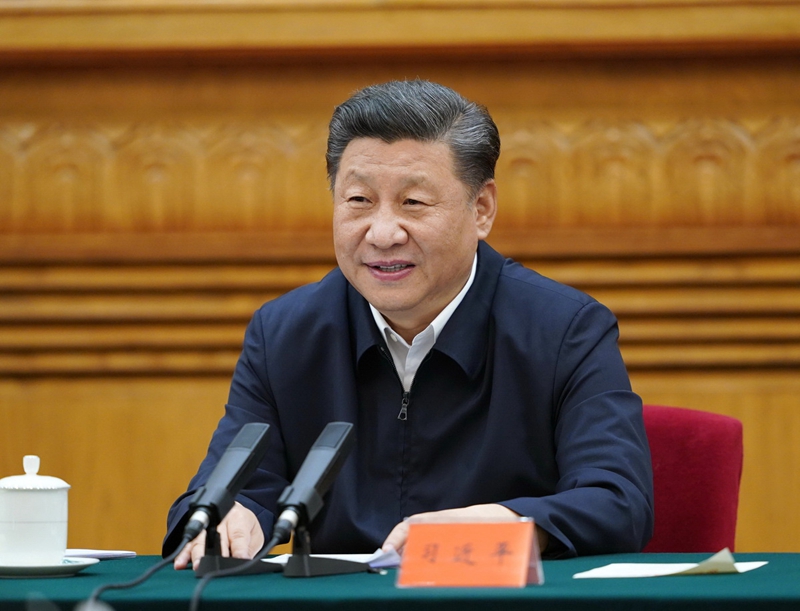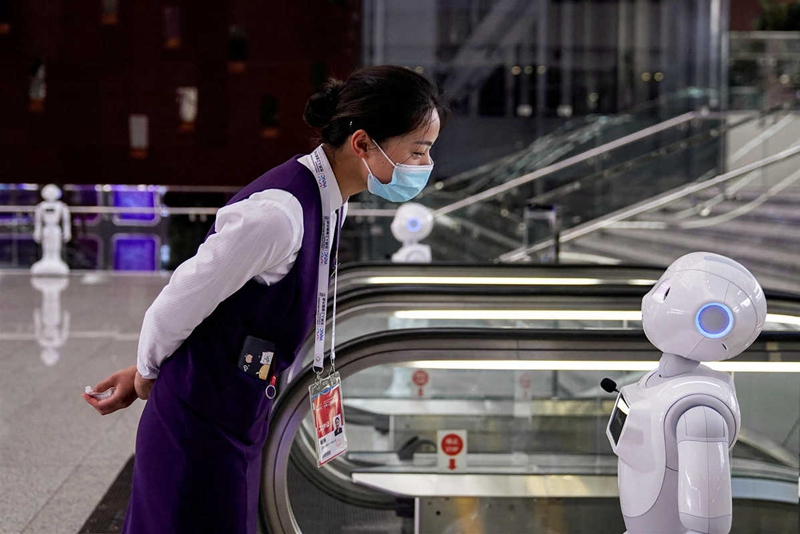Nation shifting to high-quality development

President Xi Jinping delivers a key speech on spurring the vitality of market entities and promoting entrepreneurship as he chairs a symposium with entrepreneurs in Beijing on Tuesday. [Photo/Xinhua]
Xi's remarks at symposium bolster firms' confidence, say execs, experts
China's move from export-driven growth to promoting the integration of the domestic and overseas markets reflects the country's shift to nurturing new edges in global competitiveness and fostering high-quality development despite the headwinds it faces, experts and business executives said on Wednesday.
China needs to give full play to the advantages of its ultra-large domestic market and work toward a new model of development in which the domestic economic network takes the primary role, with the domestic and international economic networks complementing each other, President Xi Jinping told senior business executives from domestic and foreign companies at a symposium on Tuesday.
Xi said the country will open up wider to the outside world during the process, fully unleash the potential of its domestic demand, enable better connectivity between the domestic and international markets and give priority to innovation in science and technology.
Wuhan Guide Infrared Co Chairman Huang Li, who attended the symposium, said: "Despite headwinds such as the mounting backlash against globalization, China is still open-minded to embrace the outside world and will continue to stick to opening up, which will inject new impetus into future growth."
"In the next step, we must continue to pursue high-quality development, give priority to technological innovation and master core technologies," Huang added.
Yang Yuanqing, chairman and CEO of Chinese tech giant Lenovo, agreed, saying that the meeting has shown that the government attaches greater importance to boosting the confidence of market entities.
"China's new development plan to combine the construction of the domestic market system with the expansion of international markets will not only help strengthen the resilience of its economic development, but also provide huge growth opportunities for the world economy," Yang said.

A staff member looks at a robot at the venue of the World Artificial Intelligence Conference in Shanghai. [Photo/Agencies]
"More efforts should be made to promote the development of digitization, automation and intelligence in manufacturing."
Under the previous export-oriented mode of growth, China grew its economy into the world's second-largest through low-cost factory production. It's now time for the country to move on, said Cui Fan, a professor of international trade at the University of International Business and Economics in Beijing.
Xi's remarks suggest that the country is moving toward the next stage of development through deepening reforms and opening-up, which will further integrate China into the world economy, Cui said.
"China does not deny the importance of opening-up. In fact, the country is pursuing a new development plan, focusing on its domestic market and meeting domestic needs," Cui said.
"Foreign investment is playing a key role in connecting the domestic and international markets. Once China establishes a unified, open and complete domestic market system, both domestic and foreign companies will be able to achieve greater efficiency and gain a key competitive edge in the global market, which will further prove China's capabilities to attract foreign capital and achieve better connectivity between the domestic and international markets," Cui said.
"The source of China's competitive advantages is shifting from low-cost labor to an ultra-large domestic market and its huge market demand. Therefore, a growing number of market-seeking and high-end foreign manufacturers are gearing up to enter the China market."
Cui said China will definitely choose not to close its doors, but will open up wider to the outside world, by taking steps such as continuously shortening the negative list for foreign investment access. "More efforts are needed to deepen supply-side structural reforms and create a better business environment."
Clarke Murphy, CEO of global executive search and assessment firm Russell Reynolds Associates, said the company sees enormous potential in the Chinese market. "We have been very dedicated to China for the past decades and will continue to be, particularly as the world is smaller and more interconnected."
"The Chinese market and relationships with Chinese companies are very important to the global economy. Sophisticated global investors will always want to be successful in China. The fact that China would create more markets and more industry segments for foreign investment will be encouraging to global investors, and younger Chinese executives want to be part of global enterprises so they can learn and grow themselves," Murphy added.
Leon Wang, global biopharmaceutical giant AstraZeneca's international executive vice-president and its president in China, said the company has confidence in China's investment environment and development prospects.
"In the face of the unprecedented challenges caused by the global epidemic, AstraZeneca is always optimistic about China's strong economic potential," Wang said.
According to Wang, AstraZeneca will continue to support China's development through actions, play an active role as a bridge for multinational pharmaceutical companies in the field of healthcare, and help achieve the "Healthy China 2030" initiative, and help Chinese innovation to go global.
Ma Si and He Wei contributed to this story.








